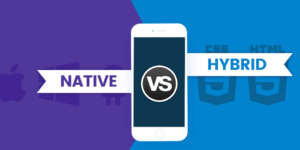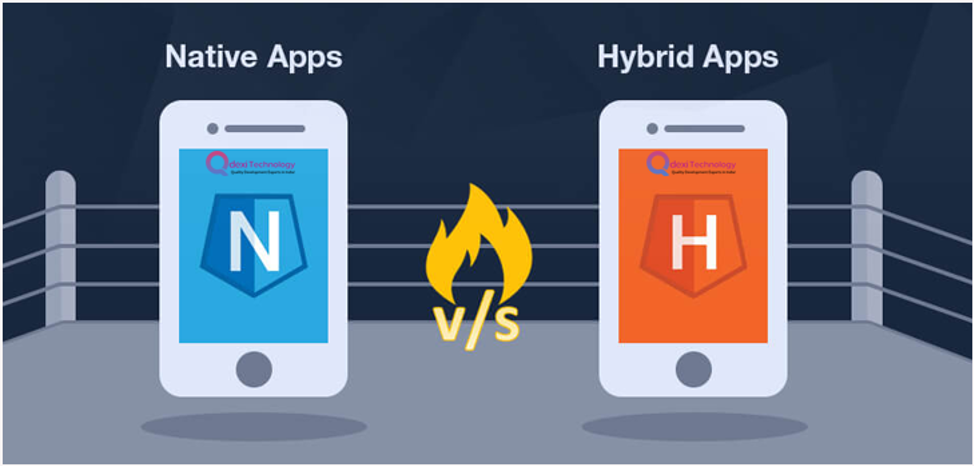Native vs Hybrid: Which one should you choose in 2021

Native VS Hybrid App Development
App development is one of the most talked-about topics in the business world today. A couple of decades ago, business leaders would debate whether they should invest in a mobile app or not. Today, this has changed and the topic in question is what type of app should one develop.
That is to say, there has been a shift from why to what. While a few enterprises stick to the old-school method of building native mobile apps for their business, others are planning to jump on the bandwagon and adopt hybrid apps.
In case you too find yourself amidst the fuss, this article will help you with the same. Highlighting the two app development frameworks, we proceed to see which one should you choose: Hybrid or Native for mobile app development.
Native Apps:
As the name suggests, native apps are native to the device for which it has been developed. What this implies is that native apps are platform-specific apps and meant only for one device in particular. If you are to build an app for the Android platform, you will use the Java programming language. On the other hand, iOS apps are built using Objective-c.
One reason why developers invest in native apps is the fact that it appears as if it is part of the device. Besides, native apps can effectively make use of device features such as camera, GPS, etc. This adds to the overall efficiency of the mobile app.
Hybrid Apps:
Hybrid apps are websites that have been packed within native wrappers. To be honest, Hybrid apps are web apps built using technologies such as JavaScript, HTML, CSS. These are then wrapped and condensed into native apps giving it the look and feel of the same. Meaning that the app works like a web app on mobile devices.
Like native apps, hybrid apps can also gain access to the built-in features of a mobile. It used APIs to connect and draw communication between the app and the desired features. One thing that separates hybrid apps from native ones is that native apps can work in an offline mode. Such is not the case with hybrid apps.
Hybrid apps emulate a web app and hence aren’t downloaded on the device. They operate directly through the web and hence, require a steady internet connection.
Native App vs Hybrid Apps
After knowing the two processes, we now draft a comparison between the two to finally conclude which is better, and why?

1. Codebase
When it comes to programming, hybrid app development requires you to work on a single code base. As known, Hybrid apps work on all platforms irrespective of the type, they have a single codebase that can work well.
On the other hand, native by definition is particularly designed for a single OS. If you need to build an app for the Android as well as the iOS platform, you would need to build two separate codes, one for each OS.
2. Accessing the hardware/software of the device
Native app development has the potential to take advantage of the built-in features of the device. For example, if you are developing a transportation app for Android/iOS mobiles, native apps allow you to integrate the GPS of the mobile and leverage the same to add real-time tracking facilities in your mobile app.
Hybrid apps, on the other hand, are not native and there’s no direct way of accessing the hardware or the software of a device using a hybrid codebase. However, you can still induce the features using plugins and APIs. This allows you to connect with the device and share features without any hassle.
3. Cost of Development
Because hybrid apps utilize a single codebase, facilitating one app for all of the platforms, the total cost of developing the app reduces dramatically. What this implies is that you can deploy an app in lesser time using minimal resources.
Native apps, however, are specific to the platform. If you need to develop an app both for the android and iOS platforms, you would need to hire two different development teams and then spend twice the money you spent on the development of a single app. This way you add to the cost of development. If you are bigger on the budget and convinced that you need a native app, you can go for it.
4. User Interface
If you are looking to design an app that offers an aesthetic look and is rich in appearance, then you must opt for native app development. While hybrid apps too offer a certain level of visual appeal, it isn’t as good as the one provided by native apps. Hybrid app development aims at improving the usability of the application whereas native apps are meant to enhance the end-user experience by offering appealing designs.
5. Performance
Talking about the performance of the application, native app development renders apps that are extremely fast and offer unmapped efficiency. They are built for the platform itself and hence, no compromise is done on the performance part.
Hybrid app development is designed to meet the requirements of multiple devices and there are times when the performance deteriorates dramatically. It would be wrong to state that Hybrid apps have poor performance. However, it is definitely less as compared to the native apps.
Conclusion
In the end, the decision is yours. One thing to remember is that both of these have their advantages and disadvantages. And there’s no such concept as best or better.
The choice of a native app or hybrid app totally depends upon your app requirements and overall budget. If you are ready to invest a lot of money and prioritize performance over other factors, native app development is the best way to start. On the other hand, if you are a startup or a medium-sized organization, looking to set up your business’s online presence, hybrid app development would be a better approach to creating apps for your business.
If you are still doubtful and prefer consulting an expert, reach out to us at Sparklin Digital!







